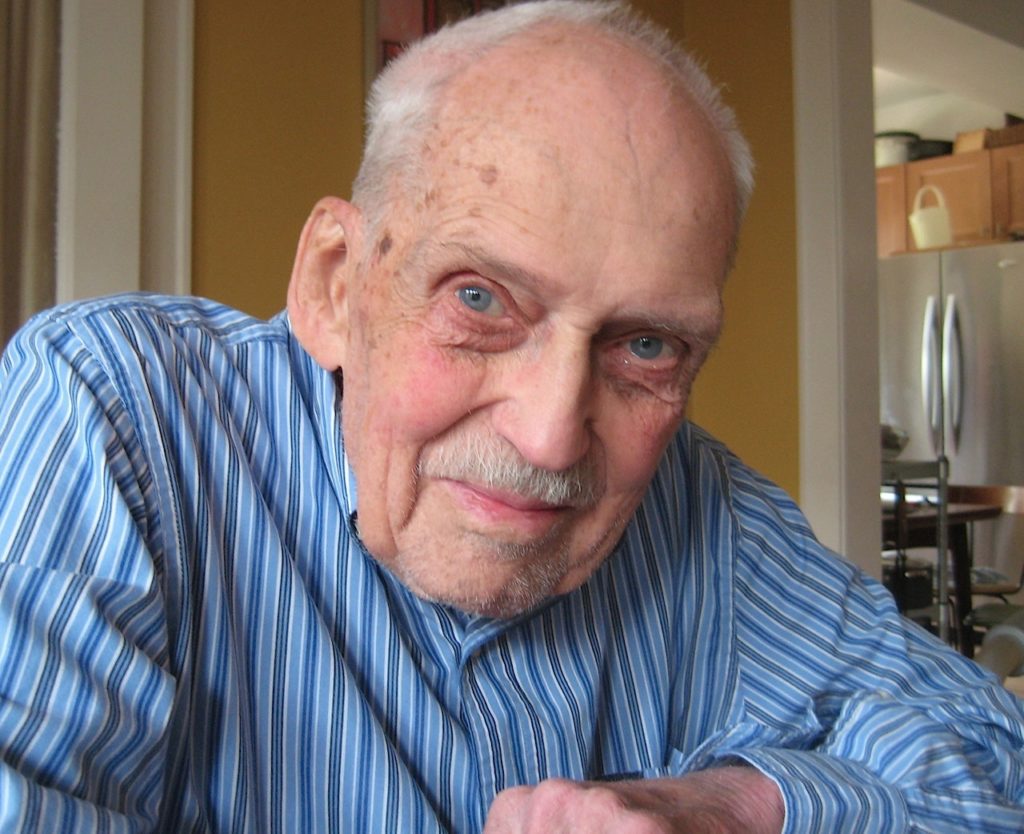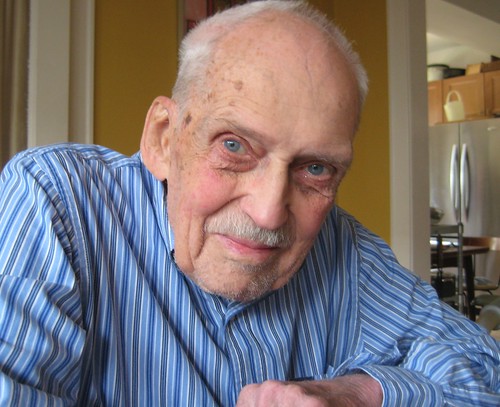
Since I always seem to be taking pictures, it seems natural that I started taking pictures of my dad on most of our visits the last few years. It wasn’t until late July, the week he died, that I looked back on what I had taken over the last year or so. I made several visits last summer, and then there was a long hiatus–from his 90th birthday weekend all the way until this past May. Over that time, his situation had changed. After a couple of episodes of pneumonia, his advancing dementia, loss of mobility, incontinence, and other issues, he needed round-the-clock nursing care. That meant he had to leave the home of my sister, Ann, and her husband, Dan, with whom he’d lived since the end of 2008, and enter a nursing home Evanston.
When he went into the facility, called Dobson Plaza, he was in pretty rough shape. He’d been there a couple of weeks by the time I visited in May and by then he seemed to have bounced back a little. I say a little: He was quite weak, confined to a wheelchair, and needed assistance for virtually every daily chore beyond feeding himself. He undertook that task with competence but little enthusiasm–maybe because his intake was reduced to pureed meals because he was having difficulty swallowing and was in danger of aspirating food and triggering another lung infection. There wasn’t much of a question that we–Dad, my siblings and I–were now waiting for the next turn, and the next turn would not be for the better.
He was losing weight, and by early July that prompted a discussion with his doctor of what kind of intervention might be appropriate (they could give him a drug of some kind to stimulate appetite). Before that conversation could reach a conclusion, I think, he suffered another bout of pneumonia and was taken up to Evanston Hospital (from my impression not a bad place to wind up if you’re in that part of the world and need medical attention). By coincidence, my brother John and I had arranged to visit at this time–he from New York, I from California–and got into town a couple days after he was hospitalized.
The news turned out to be worse than pneumonia. He was suffering congestive heart failure and tests detected the presence of fluid in the chest cavity around his lungs, signaling some other infection or even a malignancy. John and I got to Chicago late on a Saturday night, and Sunday we had a family meeting with Ann and our other brother, Chris. Since Dad had been suffering dementia, Ann had power of attorney, and among us we agreed that the course of action Dad would have pursued, or that our mom would have pursued if she’d been around, was hospice care. In essence, that meant ending aggressive attempts to fight the infections and other issues Dad was suffering from and focusing instead on taking what measures we could to make him comfortable in his remaining time. And that time? Well, he was about five weeks short of his 91st birthday and his body had kept going through a lot of hard stuff. We didn’t know whether we were looking at a day, a week, a month, or more.
Then Chris, John, and I went to see him in the hospital. Since I’d seen him in May, I felt I was prepared for what we’d see. And I wasn’t shocked to see that he was gaunter than he had been or that he looked really knocked out. But it also struck me for the first time that I was in the presence of someone who was dying, and that the death was not some abstract thing out there somewhere in the future. It was near.
Although you can fool yourself. You see someone that you’ve known your whole life, someone who has kept going through some pretty rough stuff, and anything positive–an alert look, a quick response to a question, a willingness to eat–becomes an encouraging sign. We spent about eight hours with Dad in his room, and I think we all were constantly aware of the monitors keeping track of his heart rate, his oxygen levels, his respiration. He dozed a lot, and a couple of times he seemed agitated as he started awake. His heart rate and breathing seemed to fluctuate, and I thought, “Is this it?” Then he ate a decent portion of the pureed chicken and mashed potato dinner that was on the lunch menu. I said after he finished, “It’s time to say ‘Takk for maten’ “–Norwegian for “thanks for the meal.” He glanced my way and said, “Not really.” It sounded like a dry Nordic reply.
The hospital sent him back to Dobson, the nursing home, for the hospice care we had set up. We visited each day, starting on the Monday he returned there. Dad seemed to be holding his own despite what we knew, or had been told, or suspected, was happening beneath the surface. He ate a little. He seemed to like his coffee. He seemed to like our being there. He seemed to respond when we played him some of what we remembered as his favorite classical recordings. He seemed absorbed when I began reading aloud a tale of the Norse in Greenland (I thought he’d identify with a Viking story).
And then, several days later, I headed back to California. I had an idea I’d ask for a leave to come back to Chicago and see out Dad’s last days. But things moved fast after I departed, and he died the next day. As I said several weeks ago, I missed him already. I still do. The best memory I have of that last week, though, is the time we all spent together as a family, and the best thing that happened was that we all worked together at least in those few days.
I only meant to write enough to provide some context for the pictures that follow, which in a small way record his passing. There’s still a lot left to say. Sometime. Soon.


Thanks Dan.
Sending kind thoughts to you and your family, Dan. This is a lovely and touching remembrance.
Thanks, judyb!
Hey, Ann–of course. I’ll try to call Thursday or Friday. Glad that damned hurricane didn’t hunt you down in Puerto Rico!
Excellent! Dan, you are so emotionally healthy.
Marie: That remark would prompt guffaws from some who have known me in full-rant mode. However, what do they know?
Much appreciated, as always.
It’s easy to feel your love for him. Thank you for sharing this part of his story.
Hey, Allie: Thanks for reading.